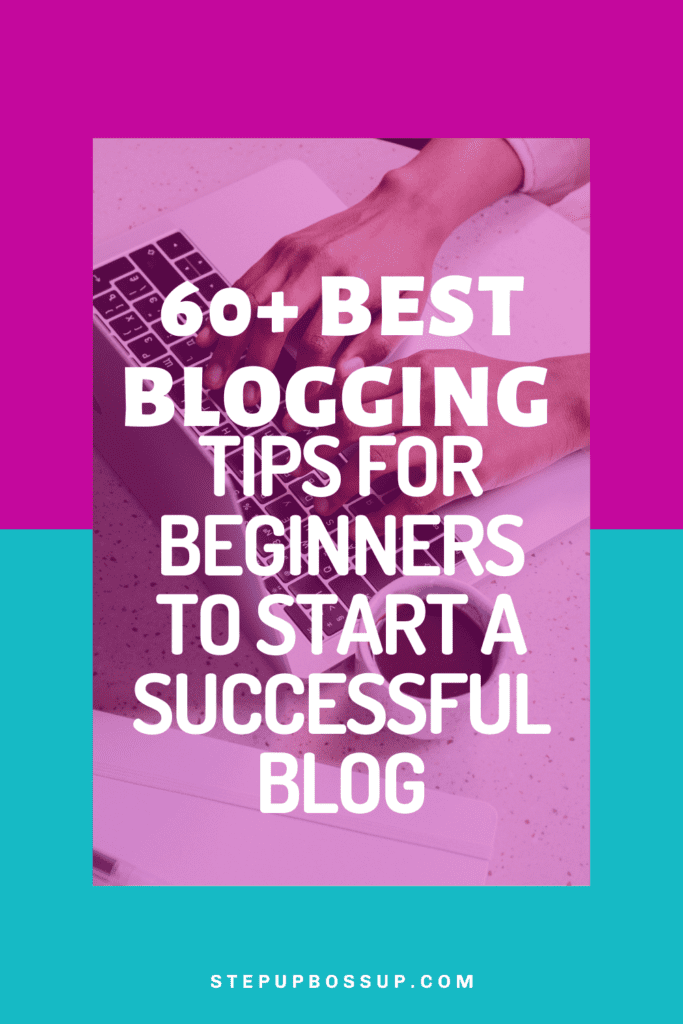Sharing is caring!
Are you considering starting a blog but not sure where to begin? Look no further!
As a passionate blogger myself, I know how overwhelming it can be to start a blog from scratch. But don’t worry, I’m here to help.
In this post, I’m going to share with you over 60 of the best blogging tips for beginners. Whether you’re a skilled writer or prefer videos and audio, I’ve got tips to get you started on your blogging journey.
By following these tips, you’ll establish yourself as an authority in your niche, gain a loyal audience, and even potentially open up new career opportunities.
So let’s dive in and explore the exciting world of blogging together!
Best Blogging Tips For Beginners
Setting Up Your Blog
Here are my top tips for setting up your blog to make money from the start.
Tips for Choosing Your Blogging Niche:
- Choose a niche that you’re passionate about and that has potential for monetization. Conduct market research and analyze competitors in your niche to ensure it has a viable audience.
- Consider choosing a niche that has a large and engaged audience, and one that you have some expertise in. Use tools like Google Trends and Keyword Planner to identify potential niches.
Deciding On A Blogging Platform:
- WordPress.org is a popular choice among bloggers because of its flexibility, customizability, and wide range of plugins and themes.
- Squarespace is another popular platform that is known for its ease of use and beautiful design templates.
Registering A Domain Name And Hosting:
- Use a reputable company with good customer support when registering your domain name and hosting.
- Choose a domain name that is memorable and easy to spell, and select a hosting plan that can handle your blog’s traffic as it grows.
Setting Up A Blog Design:
- Keep your blog design simple and easy to navigate, and use a responsive design that looks good on all devices.
- Use a professional-looking design that reflects your brand and message, and incorporate high-quality images and consistent branding throughout your blog.
Creating Compelling Content
Understanding Your Audience:
- Conduct surveys, polls or use analytics to gain insights into your audience’s interests and preferences.
- Monitor comments and feedback to understand what resonates with your audience.
- Engage with your audience through social media, email newsletters or other channels to build relationships and better understand their needs.
Researching and choosing topics:
- Use keyword research tools like Ubersuggest or SEMrush to identify topics that your audience is searching for.
- Keep up with industry news and trends to stay relevant and provide timely content.
- Brainstorm ideas by creating mind maps, using buzzsumo or reviewing competitor content.
Writing high-quality content:
- Define a clear and concise writing style that aligns with your brand and audience.
- Write in an engaging and conversational tone to keep readers interested.
- Focus on providing value and solving problems for your audience.
Optimizing content for search engines:
- Use keyword research to optimize blog titles, meta descriptions, and content.
- Optimize page speed, mobile-friendliness, and website structure to improve overall search engine optimization (SEO).
- Use internal linking and backlinking strategies to improve page authority and search rankings.
Using visuals to enhance content:
- Use relevant and high-quality images to break up text and add visual interest to your blog posts.
- Create custom graphics, infographics or videos to visually communicate complex concepts or data.
- Use alt tags and file names to optimize images for search engines.
Promoting Your Blog
Building a social media presence:
- Choose social media platforms that align with your brand and target audience.
- Create a consistent posting schedule and use social media management tools to automate and streamline your workflow.
- Engage with your followers by responding to comments and messages, and use hashtags to increase visibility.
Using email marketing:
- Build an email list by offering lead magnets, such as free e-books or webinars.
- Segment your email list and personalize your email campaigns to increase engagement.
- Use email automation to send triggered emails, such as welcome emails, to nurture leads and increase conversions.
Engaging with your audience:
- Encourage comments and feedback by asking open-ended questions or inviting discussion.
- Host live Q&A sessions or webinars to engage with your audience in real-time.
- Respond to comments and messages promptly and authentically to build trust and loyalty.
Guest posting on other blogs:
- Research and identify blogs with a similar audience and brand values.
- Pitch guest post ideas that provide value to the host blog’s audience.
- Include a bio and backlinks to your own blog to increase traffic and credibility.
Use SEO to increase visibility:
- Conduct keyword research and optimize blog titles, meta descriptions, and content.
- Use internal linking and backlinking strategies to improve page authority and search rankings.
- Optimize page speed, mobile-friendliness, and website structure to improve overall search engine optimization (SEO).
Building Your Brand
Creating a strong brand identity:
- Define your brand’s mission, values, and unique selling proposition (USP).
- Develop a brand style guide, including brand colors, typography, and visual elements.
- Use consistent branding across all platforms and channels to build brand recognition and loyalty.
Developing a unique voice:
- Define your brand’s personality and tone of voice.
- Write in a conversational and relatable tone to connect with your audience.
- Experiment with different writing styles and formats to find what resonates with your audience.
Consistency in branding:
- Use consistent branding across all platforms and channels, including social media, email, and website.
- Develop a content calendar to plan and organize your content and ensure consistency in messaging and branding.
- Monitor your brand’s reputation and make adjustments as needed to ensure consistency.
Use branding in your blog design:
- Use brand colors, typography, and visual elements in your blog design.
- Ensure your blog design is user-friendly, mobile-responsive, and reflects your brand’s personality.
- Use custom graphics and visuals that align with your brand’s aesthetic to enhance your blog’s design.
Using your blog as a platform for your brand:
- Create content that aligns with your brand’s mission, values, and USP.
- Use your blog to showcase your brand’s expertise, products, or services.
- Use your blog to connect with your audience and build relationships that align with your brand’s personality and values.

Monetizing Your Blog
Understanding different methods of monetization:
- Research and understand the different methods of monetization, including affiliate marketing, advertising, sponsored content, and selling products or services.
- Determine which method(s) align with your blog’s niche, audience, and goals.
- Consider experimenting with multiple methods of monetization to diversify your income streams.
Affiliate marketing:
- Choose affiliate products that align with your blog’s niche and audience.
- Be transparent with your audience about affiliate relationships and disclose any affiliate links.
- Write honest and informative product reviews and include affiliate links where appropriate.
Advertising:
- Choose ad networks that align with your blog’s niche and audience.
- Place ads strategically, such as above the fold and in high-traffic areas.
Sponsored content:
- Only work with brands and sponsors that align with your blog’s niche and audience.
- Disclose sponsored relationships and maintain transparency with your audience.
- Ensure sponsored content aligns with your brand values and provides value to your audience.
Selling products or services:
- Develop and sell products or services that align with your blog’s niche and audience.
- Use email marketing and social media to promote your products or services.
- Provide exceptional customer service and support to build trust and loyalty with your customers.
Staying Motivated and Consistent
Setting goals and creating a content plan:
- Set specific and measurable goals for your blog, such as increasing traffic or subscribers.
- Develop a content plan that aligns with your goals and provides value to your audience.
- Use a content calendar to organize your content and ensure consistency in publishing.
Managing your time effectively:
- Prioritize tasks based on their importance and urgency.
- Use time management tools, such as Pomodoro timers or task lists, to increase productivity.
- Limit distractions, such as social media or email, during dedicated work time.
Overcoming writer’s block:
- Take breaks and give yourself time to recharge.
- Use writing prompts or brainstorming exercises to generate new ideas.
- Write a rough draft without worrying about perfection and revise later.
Staying motivated in the face of challenges:
- Focus on your why and remind yourself of your goals and vision for your blog.
- Surround yourself with supportive and like-minded individuals.
- Take time to reflect on your progress and celebrate small wins.
Celebrating milestones and successes:
- Set milestones and celebrate when you achieve them, such as reaching a certain number of subscribers.
- Share your successes with your audience and thank them for their support.
- Take time to reflect on your journey and how far you’ve come.
Conclusion
In conclusion, starting a successful blog requires dedication, hard work, and a willingness to learn and adapt.
However, with the right approach and mindset, anyone can achieve their goals and create a thriving blog.
To recap, we’ve covered a range of topics including understanding your audience, creating high-quality content, building a social media presence, monetizing your blog, and staying motivated in the face of challenges.
By following the blogging tips and strategies outlined in this post, you can start your own successful blog and achieve your goals.
So, what are you waiting for? If you’ve been thinking about starting a blog, now is the time to take action.
Remember, every successful blogger started out as a beginner, and with persistence and hard work, you too can create a blog that resonates with your audience and achieves your goals.
I hope this post has provided you with valuable insights and inspiration to start your own successful blog.
FAQs
How long does it take to start a successful blog?
Starting a successful blog is not an overnight process. It takes time, effort, and patience to build an audience, create high-quality content, and establish yourself as an authority in your niche. The timeline for success varies from blogger to blogger, but it’s important to stay consistent and focused on your goals.
How often should I post on my blog?
The frequency of your blog posts depends on your niche, audience, and personal goals. However, it’s generally recommended to post at least once a week to keep your readers engaged and maintain a consistent presence. Posting more frequently can also help increase your visibility and drive more traffic to your blog.
Do I need to be an expert in my chosen niche to start a blog?
While having expertise in your chosen niche can certainly help, it’s not a requirement to start a successful blog. As long as you have a passion for the topic and are willing to do the research and learn along the way, you can create valuable content that resonates with your audience.
Can I start a blog for free?
Yes, it’s possible to start a blog for free using platforms like WordPress.com, Blogger, or Wix. However, keep in mind that these platforms often come with limitations, such as fewer customization options and restricted monetization methods. To fully control your blog and take advantage of all the opportunities that come with it, it’s recommended to invest in a domain name and web hosting.
How much money can I make from blogging?
The amount of money you can make from blogging depends on a variety of factors, such as your niche, audience, and monetization methods. Some bloggers earn a few hundred dollars per month, while others make six or even seven figures annually. It’s important to set realistic goals and have a clear understanding of your monetization options, such as advertising, affiliate marketing, or selling products or services.



